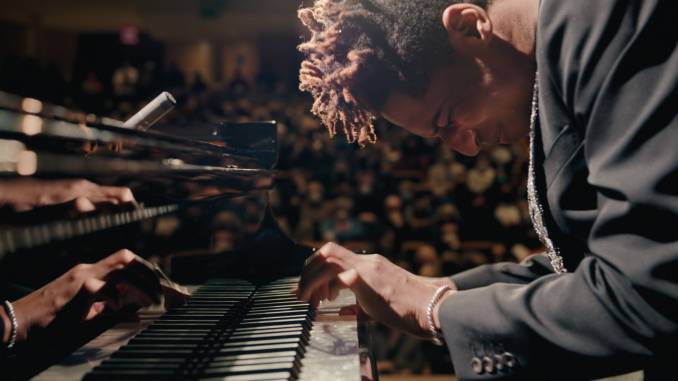Intimate Yet Simplistic, American Symphony Is a Little Flat

When you or someone you love has a chronic illness, life becomes a tightrope. There is life-or-death value in focusing on the balancing act of risk management, but if you don’t also move forward, what’s the point? COVID continues to exacerbate that contradiction, rubbing in the cruelty of a society that asks some of its members to simply survive while the rest run free. Things are back to normal, what’s your problem? Anxiety mounts as onlookers become hecklers: The circus is no longer impressed, but frustrated by your caution. At its best, American Symphony is a COVID film, filled with masks and the yearning desire for connection that accompanied the first tiptoes back into civilization. It’s also walking that tightrope. Jon Batiste, one of the biggest musicians in the world, reaches his career zenith just as his wife, New York Times columnist Suleika Jaouad, is deep in the trenches fighting her old foe: leukemia. Though filmmaker Matthew Heineman’s intimate yet simplistic documentary is not always about their relationship, American Symphony is most striking as an example of this highwire act—revealing the personal perils faced by those who, outwardly, may strike us as immune from this kind of suffering.
A throughline of suffering, tenuous as it is, seems antithetical to Batiste’s smiley persona. Though we see glimpses of him at political protests, the spindly bandleader and composer most frequently offers up a surface-level “coexist” vibe, one assured that everyone can place their troubles aside to share in some collective expression. (Expression of what, exactly, the film is not keen on digging into.) American Symphony itself is at its most mundane when focused on the professional life of the rousing, youthful musical multihyphenate. And, because it builds its structure around the creation and premiere of his first symphony, much of the film bundles that mundanity into the kind of behind-the-scenes footage accompanying a concert doc.
Batiste, in awe at his own rehearsal (“Never seen a conductor in Jordans before,” he quips to one of his players), has an arm’s length charm. We’re here to get a better sense of Batiste, not understand his music, let alone see the process of composition. But his moments of leadership are introductory platitudes, any real instruction left outside the frame. He claims he puts pressure on those he plays with, thinking they make their best music under a little bit of hardship. We understand he’s mostly talking about himself, but his interactions with others feel especially sanitized in light of this comment.
What we do get of his music is only, fittingly, a motif: A melody, a simple theme that even the tinniest ear can hold onto and a musical line that can be turned into a narrative, evolving from a hum and rhythm pounded out on a sofa, to a piano line, to a fully orchestrated piece. We never learn the titles of American Symphony’s movements (“Capitalism,” “Integrity,” “Globalism” and “Majesty”) or see alluded-to conversations between Batiste and the Indigenous performers who join his ensemble. We get a catchy little riff, inherently reductive of the daunting achievement that dominates the runtime.
The quality and duration of access, ranging from hospital beds to the very stage of Carnegie Hall, implies an insight into his creative process and intentions that we never receive. Batiste is a fascinating subject, coming from such a legendary New Orleans jazz family that HBO’s Treme named Wendell Pierce’s trombone-toting protagonist Antoine Batiste. From Oscar-nominated scores (Soul) to a rousing late-night gig (The Late Show with Stephen Colbert) to Grammy after Grammy after Grammy, he’s already at the highest levels of musical achievement—and he’s not even 40. His expansive ambitions for American Symphony owe plenty to fellow New Orleanian Wynton Marsalis, who wrote a history-reckoning jazz composition that became the first to ever win a Pulitzer. Despite ostensibly riding alongside Batiste throughout his journey, we never really know what he’s thinking about his music beyond the sound bites.
-

-

-

-

-

-

-

-

-

-

-

-

-

-

-

-

-

-

-

-

-

-

-

-

-

-

-

-

-

-

-

-

-

-

-

-

-

-

-

-








































